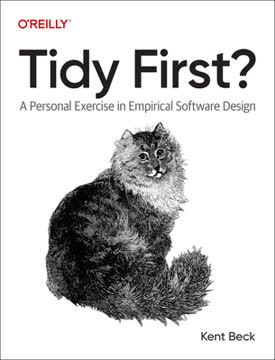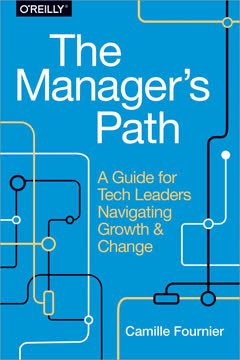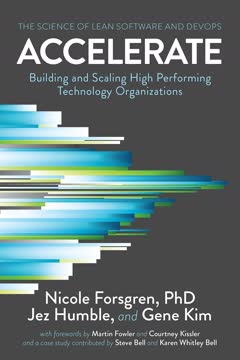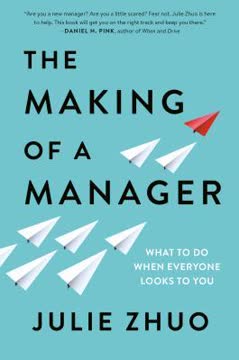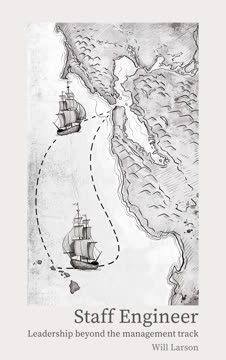نکات کلیدی
1. اعتماد و آسیبپذیری، پایههای مدیریت مؤثر مهندسی هستند
"اعتماد به تدریج ساخته میشود و به سرعت از بین میرود."
اعتماد را به تدریج بسازید. اعتماد سنگ بنای هر تیم موفقی است، اما توسعه آن زمان میبرد. به عنوان یک مدیر، باید با مثال زدن پیشرو باشید و آسیبپذیری خود را نشان دهید و به اشتباهات خود اعتراف کنید. این کار محیطی را ایجاد میکند که اعضای تیم احساس امنیت کنند تا ریسک کنند و صادقانه صحبت کنند.
ایمنی روانی را تقویت کنید. ارتباطات باز را تشویق کنید و فضاهایی ایجاد کنید که اعضای تیم بتوانند نگرانیهای خود را بدون ترس از قضاوت بیان کنند. این ممکن است شامل:
- جلسات یک به یک منظم
- بازنگریهای تیمی
- کانالهای بازخورد ناشناس
مراقبت را نشان دهید. به رفاه و اهداف شغلی اعضای تیم خود علاقه واقعی نشان دهید. این کار روابط قویتری ایجاد کرده و وفاداری را افزایش میدهد.
2. خوشحالی و انگیزه تیم خود را در اولویت قرار دهید تا عملکرد بهینهای داشته باشید
"نگرانی شما از اینکه مدیر خوبی نیستید، بخشی کلیدی از بودن یک مدیر خوب است."
محیط کار مثبت ایجاد کنید. تیمهای شاد، تولیدیتر و نوآورتر هستند. بر روی:
- جشن گرفتن پیروزیها، بزرگ و کوچک
- ارائه کار معنادار
- فراهم کردن فرصتهای رشد و یادگیری تمرکز کنید.
انگیزه درونی را تقویت کنید. به اعضای تیم کمک کنید تا کار خود را به اهداف بزرگتر و ارزشهای شخصی مرتبط کنند. این کار حس هدفمندی و مالکیت ایجاد میکند.
وضعیتهای جریان را تشویق کنید. شرایطی را فراهم کنید که امکان کار عمیق و متمرکز را فراهم کند:
- حداقل کردن وقفهها
- ارائه وظایف چالشبرانگیز اما قابل دستیابی
- اطمینان از اهداف و بازخوردهای واضح
3. مسیرهای شغلی واضح و بازخوردهای منظم ارائه دهید تا رشد را تقویت کنید
"اگر نمیدانید به کجا میروید، ممکن است به جایی دیگر برسید."
سیستم ترقی شغلی را پیادهسازی کنید. چارچوب روشنی برای پیشرفت در سازمان خود ایجاد کنید. این باید شامل:
- مهارتها و شایستگیهای مورد نیاز در هر سطح
- انتظارات برای نقشهای مختلف
- مسیرهای شغلی بالقوه باشد.
بحثهای شغلی منظم انجام دهید. از ابزارهایی مانند:
- برنامههای 30/60/90 روزه
- جلسات تعیین اهداف سهماهه
- ارزیابیهای سالانه عملکرد استفاده کنید.
اهداف فردی را با اهداف شرکت همسو کنید. به اعضای تیم کمک کنید تا ببینند کارشان چگونه به تصویر بزرگتر کمک میکند و این کار باعث افزایش درگیری و انگیزه میشود.
4. هنر ارائه و دریافت بازخورد را برای بهبود مستمر تسلط پیدا کنید
"مراقبت شخصی به معنای شخصیسازی نیست."
صداقت رادیکال را تمرین کنید. بازخوردی که هم مهربان و هم واضح باشد ارائه دهید. بر روی رفتارهای خاص و تأثیر آنها تمرکز کنید، نه ویژگیهای شخصی.
فرهنگ غنی از بازخورد ایجاد کنید. بازخورد منظم و دوطرفه را تشویق کنید:
- از مدیر به کارمند
- از کارمند به مدیر
- از همکار به همکار
بازخورد را با کمال میل دریافت کنید. با جستجوی فعالانه بازخورد، گوش دادن بدون دفاع و اقدام بر اساس انتقادات سازنده، الگوی باز بودن به بازخورد را نشان دهید.
5. جلسات مؤثری برگزار کنید که به زمان و نظرات همه احترام بگذارد
"بخشی از هدف جلسه، خود بحث است."
هدف و دستور جلسه واضح داشته باشید. هر جلسه باید شامل:
- هدف مشخص
- دستور جلسه مکتوب که از قبل به اشتراک گذاشته شده باشد
- نقشهای واضح (مدیر جلسه، یادداشتبردار و غیره) باشد.
شرکت را تشویق کنید. محیطی فراگیر ایجاد کنید که در آن همه صداها شنیده شوند:
- از تکنیکهای دورانی استفاده کنید
- از طوفان فکری خاموش بهره ببرید
- به اعضای تیم که کمتر صحبت میکنند، توجه کنید.
با موارد عملی پایان دهید. هر جلسه را با:
- خلاصهای از تصمیمات اتخاذ شده
- تعیین مراحل بعدی و مسئولان
- تعیین مهلتهای پیگیری به پایان برسانید.
6. به طور سازنده با تعارضات مدیریت کنید تا نوآوری و همکاری را تقویت کنید
"تعارض در واقع بخشی ضروری و سالم از یک محیط کاری تولیدی است."
تعارض سازنده را بپذیرید. بحثهای سالم و دیدگاههای مختلف را برای تحریک نوآوری و تصمیمگیری بهتر تشویق کنید.
مسائل را به سرعت حل کنید. اجازه ندهید تعارضات به حالت غلیظ درآیند. گفتگوهای دشوار را زود و به طور مکرر انجام دهید تا از تشدید جلوگیری کنید.
بر روی اهداف مشترک تمرکز کنید. وقتی تعارضات پیش میآید، اعضای تیم را به یاد اهداف و مقاصد مشترکی که در حال کار بر روی آن هستند، بیندازید.
از تکنیکهای حل تعارض استفاده کنید:
- گوش دادن فعال
- تلاش برای درک همه دیدگاهها
- یافتن راهحلهای برد-برد در صورت امکان
7. کار محصول و مهندسی را متعادل کنید تا تأثیر تیم را به حداکثر برسانید
"فقط سریع رفتن کافی نیست. شما میتوانید در جهت نادرست سریع بروید."
زمان را به طور استراتژیک تخصیص دهید. انتظارات روشنی برای تقسیم زمان بین:
- توسعه ویژگیهای جدید
- کاهش بدهی فنی
- بهبود زیرساختها تعیین کنید.
اولویتها را به وضوح ارتباط دهید. اطمینان حاصل کنید که کل تیم درک کند:
- حوزههای تمرکز فعلی
- دلایل پشت تصمیمات
- نتایج مورد انتظار
انعطافپذیر باشید. تعادل را بر اساس:
- اهداف تجاری
- چالشهای فنی
- بازخورد تیم تنظیم کنید.
8. پروژهها و درخواستهای ادغام را کوچک کنید تا تکرار سریعتر و نتایج بهتری داشته باشید
"PRهای کوچک مکالمه را متمرکز نگه میدارند و به این ترتیب نیاز به هرگونه حرکات ارتباطی را کاهش میدهند."
کار را به بخشهای کوچکتر تقسیم کنید. اعضای تیم را تشویق کنید تا:
- درخواستهای ادغام متمرکز و تکمنظوره ایجاد کنند
- از پرچمهای ویژگی برای راهاندازی تدریجی استفاده کنند
- درخواستهای کار در حال پیشرفت را برای بازخورد زودهنگام ارسال کنند.
فرایندهای بازبینی را بهبود بخشید. بازبینی کد را با:
- تعیین انتظارات واضح برای بازبینها
- استفاده از ابزارهای خودکار برای بررسی سبک و چکهای پایه
- تشویق برنامهنویسی جفتی برای تغییرات پیچیده، کارآمدتر کنید.
سریع تکرار کنید. چرخههای بازخورد سریع را بپذیرید تا:
- مشکلات را زود شناسایی کنید
- تلاشهای هدر رفته را کاهش دهید
- شتاب تیم را حفظ کنید.
9. وظایف را بر اساس ارزشها و سطوح انرژی اولویتبندی کنید تا به حداکثر بهرهوری برسید
"اقدامات شما نشان میدهد که واقعاً چه میخواهید."
کار را با ارزشهای شخصی همسو کنید. به طور منظم بر روی ارزشهای اصلی خود تأمل کنید و اطمینان حاصل کنید که کارتان با آنها همخوانی دارد. این کار انگیزه و رضایت را افزایش میدهد.
با ریتمهای طبیعی خود کار کنید. زمانهای اوج انرژی خود را شناسایی کنید و وظایف مهم را بر اساس آن زمانبندی کنید:
- زمانهای با انرژی بالا: کار عمیق، وظایف خلاقانه
- زمانهای با انرژی پایین: کارهای اداری، وظایف روتین
از تکنیکهای اولویتبندی استفاده کنید:
- ماتریس آیزنهاور (فوری در مقابل مهم)
- زمانبندی
- تابلوهای کانبان شخصی
10. مرزهای سالمی تعیین کنید تا تعادل کار و زندگی را حفظ کرده و از خستگی جلوگیری کنید
"گفتن نه وقتی کسی ابتدا میپرسد، نه در آینده، مهم است."
یاد بگیرید که نه بگویید. زمان و انرژی خود را با رد کردن تعهداتی که با اولویتها یا ارزشهای شما همخوانی ندارند، محافظت کنید.
ساعات کاری واضحی تعیین کنید. در دسترس بودن خود را به تیم خود اعلام کنید و تا حد امکان به آن پایبند باشید.
مراقبت از خود را تمرین کنید. فعالیتهایی را که شما را شارژ میکنند، در اولویت قرار دهید:
- ورزش منظم
- سرگرمیها و علایق خارج از کار
- وقت گذرانی با خانواده و دوستان
به طور مؤثر واگذار کنید. به اعضای تیم خود اعتماد کنید و از میکرو مدیریت خودداری کنید.
آخرین بهروزرسانی::
FAQ
What's "Engineering Management for the Rest of Us" about?
- Overview: "Engineering Management for the Rest of Us" by Sarah Drasner is a comprehensive guide for both aspiring and current engineering managers. It provides practical advice on managing teams, fostering collaboration, and enhancing productivity.
- Target Audience: The book is designed for those who have transitioned from engineering roles to management, often without formal training, and need guidance on leading effectively.
- Content Structure: It is divided into four parts: Your Team, Collaboration, Helping Your Team Do Their Best Work, and Your Work, each focusing on different aspects of engineering management.
- Real-World Examples: The book includes real-world examples and anecdotes to illustrate key points, making it relatable and actionable for readers.
Why should I read "Engineering Management for the Rest of Us"?
- Practical Advice: The book offers actionable tips and strategies for managing engineering teams, making it a valuable resource for new and experienced managers alike.
- Empathy and Passion: Sarah Drasner emphasizes empathy and passion in leadership, encouraging managers to build trust and psychological safety within their teams.
- Comprehensive Coverage: It covers a wide range of topics, from career laddering and feedback to conflict management and prioritization, providing a holistic view of engineering management.
- Relatable and Engaging: The book is written in an engaging and often humorous style, making complex management concepts accessible and enjoyable to read.
What are the key takeaways of "Engineering Management for the Rest of Us"?
- Trust and Vulnerability: Building trust and modeling vulnerability are crucial for effective team management and fostering a supportive work environment.
- Prioritization and Clarity: Managers should focus on aligning teams with clear objectives and priorities to ensure efficient execution and avoid chaos.
- Feedback and Growth: Constructive feedback is essential for personal and team growth, and managers should create a culture where feedback is welcomed and acted upon.
- Self-Care and Resilience: Managers need to prioritize their own well-being to maintain resilience and effectively support their teams.
How does Sarah Drasner define "values" in the context of engineering management?
- Core Beliefs: Values are fundamental beliefs that guide actions and decisions, helping individuals and teams determine what is important.
- Individual and Team Values: Understanding both individual and team values can provide context for behavior and help build mutual understanding and trust.
- Values Exercises: Drasner suggests conducting values exercises with teams to uncover shared values and foster a supportive and cohesive work environment.
- Alignment and Boundaries: Aligning work with personal and team values can prevent burnout and ensure that boundaries are respected.
What is the importance of "trust and vulnerability" according to Sarah Drasner?
- Foundation of Teamwork: Trust is the foundation of effective teamwork, enabling open communication, collaboration, and innovation.
- Modeling Vulnerability: Managers should model vulnerability by admitting mistakes and showing empathy, which encourages team members to do the same.
- Building Trust: Trust is built gradually through consistent actions and communication, and it can be easily lost if not nurtured.
- Impact on Performance: High-trust teams tend to perform better, as trust fosters a positive work environment and reduces fear of failure.
How does "Engineering Management for the Rest of Us" address feedback?
- Feedback as a Partnership: Feedback should be viewed as a partnership aimed at mutual growth, rather than a top-down directive.
- Constructive and Timely: Feedback should be specific, constructive, and delivered as soon as possible to be effective and actionable.
- Receiving Feedback: Managers should also seek feedback to improve their leadership skills and demonstrate a culture of continuous learning.
- Feedback Challenges: The book acknowledges the challenges of giving and receiving feedback, emphasizing the need for empathy and understanding.
What strategies does Sarah Drasner suggest for "prioritizing your team's work"?
- Align with Objectives: Prioritize tasks that align with the team's objectives and key results (OKRs) to ensure focus and clarity.
- Break Down Tasks: Break down large projects into manageable tasks to facilitate progress tracking and reduce overwhelm.
- Use of Tools: Utilize tools like kanban boards and labels to organize and visualize work, making it easier to manage and prioritize.
- Regular Review: Regularly review and adjust priorities based on changing circumstances and feedback to maintain alignment with goals.
How does the book suggest handling "conflicts" within a team?
- Embrace Conflict: View conflict as an opportunity for growth and innovation, rather than something to be avoided.
- Separate Ideas from Identity: Encourage team members to focus on ideas rather than personal identities to facilitate productive discussions.
- Immediate Action: Address conflicts promptly to prevent them from escalating and affecting team morale and productivity.
- Values and Conflict: Understanding team members' values can provide insight into conflicts and help find common ground for resolution.
What is the role of "career laddering" in engineering management according to the book?
- Defining Expectations: Career laddering provides a clear framework for what is expected at different levels of a role, guiding career progression.
- Clarity and Growth: It offers clarity on growth paths, helping employees understand how to advance and what skills to develop.
- Partnership Approach: Managers should work with employees to align career laddering with personal goals and company needs, fostering a sense of partnership.
- Regular Review: Regularly reviewing career ladders ensures they remain relevant and aligned with both individual and organizational goals.
How does Sarah Drasner recommend "setting boundaries" as a manager?
- Importance of Boundaries: Setting boundaries is crucial for maintaining personal well-being and preventing burnout in a demanding role.
- Saying No: Learn to say no to tasks that do not align with priorities or values, and communicate boundaries clearly to others.
- Balance and Flexibility: Balance is key, and boundaries should be flexible enough to adapt to changing circumstances without compromising core values.
- Modeling Behavior: Managers should model healthy boundary-setting behavior to encourage their teams to do the same.
What are some of the best quotes from "Engineering Management for the Rest of Us" and what do they mean?
- "Trust is built in drops and lost in buckets." This quote emphasizes the gradual nature of building trust and how easily it can be lost, highlighting the importance of consistent, trustworthy actions.
- "The fact that you’re worried that you’re not a good manager is a key part of being a good manager." This reflects the idea that self-awareness and concern for one's effectiveness are crucial traits of a good manager.
- "If everything is important, nothing is." This underscores the necessity of prioritization, as trying to do everything at once leads to inefficiency and lack of focus.
- "You can’t call yourself a leader by coming into a situation that is by nature uncertain, ambiguous—and create confusion. You have to create clarity where none exists." This quote highlights the leader's role in providing clarity and direction amidst uncertainty.
How does "Engineering Management for the Rest of Us" address "self-care and resilience" for managers?
- Self-Care Importance: Self-care is essential for maintaining resilience and effectiveness as a manager, preventing burnout and stress.
- Finding Joy: Managers should find joy in small moments and practice gratitude to enhance resilience and maintain a positive outlook.
- Gratitude Journaling: Keeping a gratitude journal can help shift focus from negativity to positivity, improving mental well-being.
- Support Systems: Building a support system, including coaching and mentorship, provides managers with the resources and encouragement needed to navigate challenges.
نقد و بررسی
کتاب مدیریت مهندسی برای بقیه ما عمدتاً نظرات مثبتی دریافت کرده و به خاطر مشاورههای عملی، سبک قابل دسترس و تمرکز بر اعتماد و دینامیکهای انسانی مورد تحسین قرار گرفته است. خوانندگان از تجربیات شخصی و بینشهای نویسنده قدردانی میکنند. برخی آن را منبعی عالی برای مدیران جدید میدانند، در حالی که دیگران اشاره میکنند که این کتاب به مباحث پایهای میپردازد و به عمق نمیپردازد. منتقدان بیان میکنند که ممکن است برای مدیران با تجربه بیش از حد ساده باشد. بهطور کلی، این کتاب بهعنوان راهنمایی ارزشمند برای کسانی که به مدیریت مهندسی منتقل میشوند، در نظر گرفته میشود و تعادلی بین نظریه و مشاورههای عملی ارائه میدهد.
Similar Books

